Getting Started
by David Arnold
“Just say, someday I will; someday I will.”
Jimmy Buffet
My inclination is to blame everything on Duckworks,
but that would not be fair. I have been collecting boat plans
and books for years and, and, as a surrogate to actually building
a boat, own one of the largest collections of unfinished ship
models known to exist. But I do have an excuse! I do! I was
in the military for a lot of years and then grad school and
all, and none of those are conducive to building a boat. I did
own a couple boats though while stationed variously in Vermont,
the Chesapeake Bay area, and TVA country. I had a great opportunity
a few years ago to build something when I actually had a place
with several acres and a barn and a big shed sort of thing,
but with commuting and three kids and trying take care of the
farm and fences and all; well…no boat.
So now, what with everyone in Duckworks prodding
me and my really getting the bug again, I have gone and bought
some new power tools and am going through plans and models again.
The tools also carry some promises made about quilt racks and
garden arbors and picture frames and stuff, but the real agenda
is BUILD A BOAT!
Where I live in Central Kentucky, sailing really
isn’t really much of an option, and I’m getting
a bit longer in the tooth, so to get something manageable but
with more room and capacity than just a sailing or rowing dingy,
I decided to look at outboard power. Enter Jim
Michalak’s excellent range of plans. They
are straightforward, elegant (mostly) and relatively simple
for a first timer. Clinker built and wineglass transoms are
really impressive, but…maybe not as a first shot. After
dithering for six months, I ordered a set of AF4 plans last
year. I really like the basic approach to construction and the
appearance. Anything with a raised flush deck reminiscent of
Crocker’s Stone Horse or the small Elco cruisers really
gets to me.
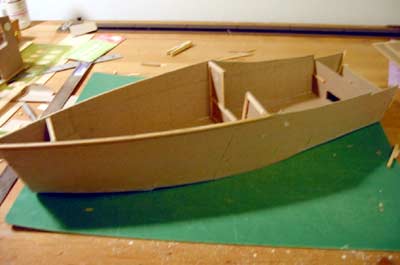
I did a lot of sketching and then started to put
together a chipboard model. I still like the design, but I wasn’t
completely convinced. I wasn’t really happy with the amount
of interior volume in the cuddy for the length. Also, I couldn’t
see convincing my wife to let me leave the garage door open
for several weeks or months or whatever because the AF4
was too long to accommodate during construction. The AF4
Breve would fit in the garage, but it’s even
shorter on volume. By the way, if the photos are a little fuzzy,
I apologize. My camera has some sort of ranging and delay circuit
in the flash that is a bit like firing a flintlock pistol –
a click, simmer, pop, flash sort of delay that sometimes makes
it hard to hold steady for close work.
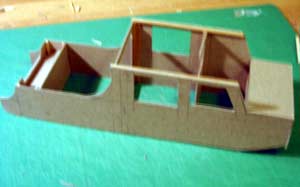
Next, I spent a lot of time sketching variations
on Mr. Michalak’s Harmonica
and Shanteuse
designs. I’ve got a lot of rivers and medium sized lakes
the area. The shanty boat style with room for a small camp stove,
a coffee pot, and a comfortable chair or two has some real appeal
here in the heart of houseboat country. In an attempt to do
a little bit more “boaty” profile, I put together
one sketch model that combined Shanteuse scale with something
of Steve Lewis’s Chugger design. Chugger is a design so
appealing and homely and so instantly feasible that I almost
bought plywood the day I discovered it, but calm returned. Lots
of nice sketches were the result, but no decision. I just wasn’t
convinced by either the appearance or by the narrow beam.
Once I identified the beam to length discussion
as the real issue and decided I had to go wider than a four
foot sheet despite the cost, Michalak’s Sows’ Ear
entered the equation. It’s a bit roomier than the AF4
but still fits my building area. It appears to be even a bit
simpler in construction than AF4, having the vertical hull sections
of Harmonica or Shanteuse which are acceptable to me at this
point because I don’t really care about going fast. And
it is kind of cute. Another order thru Duckworks produced another
set of plans, and out came the chipboard, mat board, knives,
and glue again.
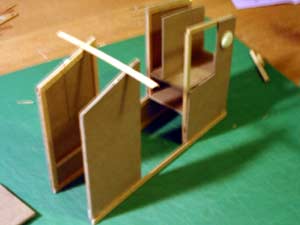
My model making skills have deteriorated since
design school, but I’m about halfway into a first sketch
model now for a Sows’ Ear. The first picture (above) is
the paired midships bulkheads. I’ve opened the portside
forward one up a bit in the model to let a little more light
and space sneak into the cuddy. I’ve also sketched in
some dividers on the port side to fit water jerrycans, stoves,
and other gear I own. This is very tentative. I’d like
to get about three to six more inches between these two bulkheads,
but I’m not sure about the consequences of that.
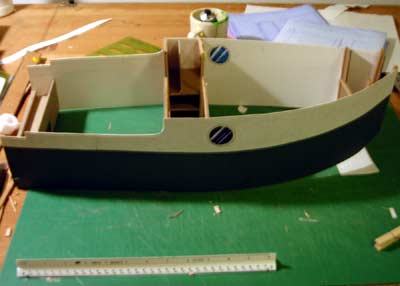
The next photo shows the model with the hull panels
on but no bottom or decking. I’ve modified the flat run
of the upper sheer aft of the cabin bulkhead for purely appearance
reasons. I suspect that I will build the hull with the straight
sheer shown in the plan for stability during construction and
then cut the new pattern when the hull is turned over. The rub
rails and details are not in place yet, but the color line shows
that I am altering the curve of the lower rub rail somewhat.
Also the astute observer will note that the portholes are out
of whack. Oh well…
That’s where I stand. I’m not yet
firm on cockpit and interior design in the cuddy, and I suspect
I will do some modification on in the space between the transom
and the after bulkhead. I have some mock ups to do maybe. Then
again, I might build her empty and then see how things fit in.
I’m also not sure yet about the final configuration of
the slot top arrangement. I’m not completely sold on the
slot top approach, although there are some really distinct advantages
to it. Lots to do, including a massive upload to Goodwill or
a garage sale to make some room, but I am going to make sawdust
soon.
I’ll keep you posted.
Addendum:
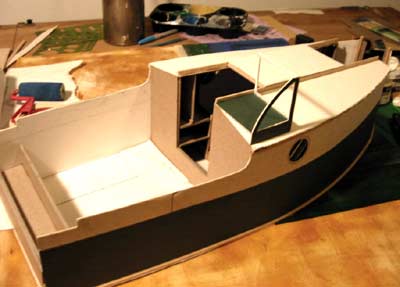
Since I first submitted this article, I have continued
to mess with the model. As I mentioned, I'm not completely sold
on the slot top, but am still unsure. Here is a photo of the
model with a partial overhead cover. I'm wondering if this should
be a skylight. The complexity of hatch details may bring the
slot top back. Also, I've sketched in one side of a windscreen
with a flat surface behind it to serve as a working surface
for charts or whatever at the helm station. I intend to use
wheel steering on the port bulkhead. If I can figure it out,
the windscreen would extend on across to port. Anyway, I'm still
moving forward.
David Arnold
Versailles, KY
Arnolds@qx.net

